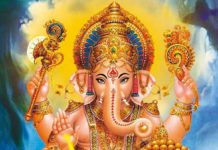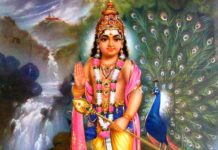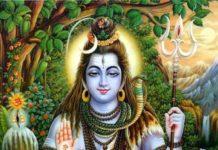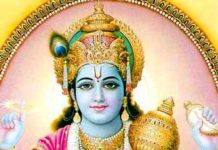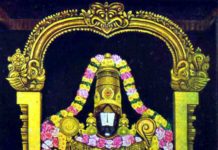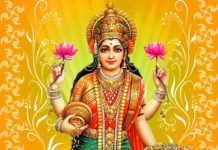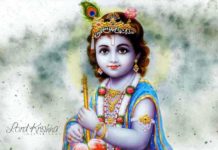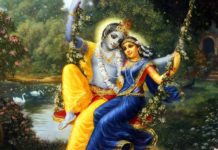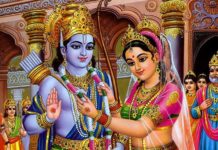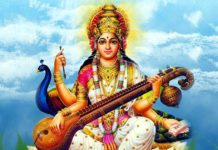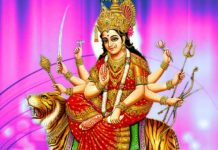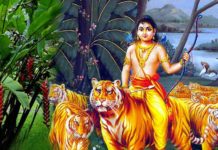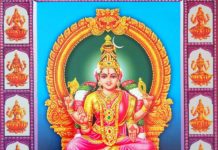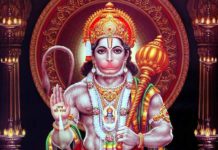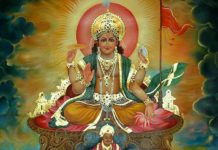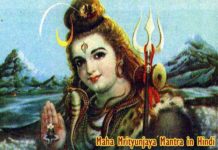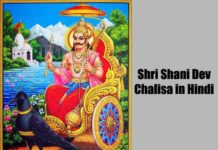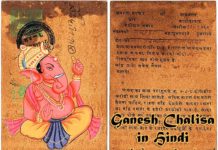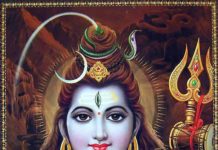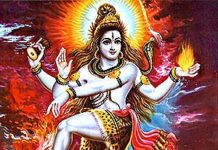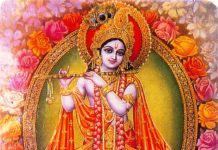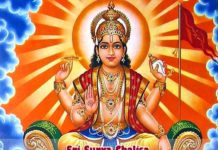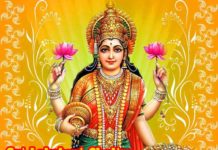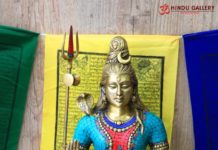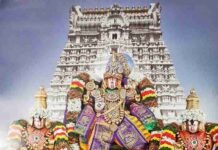Sri Krodhi is the new year as per Hindu Calendar. The Hindu Calendar has sixty years each with a name and significance.
Some regions of India consider only Solar calendar to ascertain the run of a year; The other regions consider only the luni-solar calendar for the purpose. Hence there are two versions of Hindu new year celebrations.
Similarly, even rituals like marriage, Gruha Pravesh etc., are conducted only at nights in certain regions and only at day time in the other regions. This difference also occurs due to the following of the respective calendars (solar / luni-solar).
Sri Krodhi and all the years as per Hindu Calendar commence with Chaitra month. The dawn of Chaitra is considered as the new year day. It is celebrated in different names in different regions. The rituals are also different.
However, there are common elements such as special prayer and worship to God, visiting temples, doing special poojas, wearing new dresses, getting blessings from the elders and partaking of food with family and friends with special dishes. Reading of almanac or panchangam denoting the prospects and goodness of the new year is also a predominant feature of the festivities.
The synopsis of the festivities across a few regions of India with respect to the celebration of Hindu New Year Sri Krodhi is given in this narrative.
Puthaandu
In Tamil speaking regions, the Hindu New Year is called as “Varusha Pirappu” or “Thamizh Puthandu” or “Puthu Varusha Pirappu”.
Special rangoli / kolams are drawn in front of the house. Smearing of ‘’Kaavi”, the paste of red stone around the kolam is considered auspicious. The entrance of the house is decorated with mango leaves and palm leaves (thoranam).

Payasam and Vada are the special dishes made for the day. Visiting temples, having darshan of Gods / Goddesses and doing archana are invariably done.
Thamizh Puthandu is on Sunday, 14th April 2024.
Pana Sankranthi
This is the first day of the solar month Mesha. It is celebrated as Pana Sankranti / Maha Bisuba Sankranti in Orissa. It is also considered as the birthday of Bhagwan Hanuman.
People take holy dip in rivers and visit Shiv, Shakthi and Hanuman temples. Community fairs and street dances are held.
The main event is the daring walk on the surface of burning coals by the volunteers cheered by the onlookers with song and dance.

There is a dance named Danda Nata whereby the performers take dip in the village ponds, walk over the bed of burning coals and again get into the pond. This signifies liberation from pain.
Chariot yatras are held at the temples for a week. Group of 2 or 4 men wear feminine dresses and perform ‘’Jhama nata” dance. The special dish made for the occasion is Pana which is the combination of chilled sweet mango, milk, yogurt and coconut.
Pana Sankranthi is celebrated on Saturday, 13th April 2024.
Baisakhi
It is celebrated as Vaisakhi / Baisakhi in Punjab. Baisakhi is celebrated as Sikh new year which denotes the formation of Khalsa panth of warriors by Guru Gobind Singh in 1699.
On this day, Gurudwaras are decorated, people take holy dip in rivers & ponds, visit Gurudwaras and hold kirtans.

Hindus in Punjab celebrate this day as harvest festival, they take holy dip in rivers, visit temples, do prayers and partake special foods.
Baisakhi is celebrated on Saturday, 13th April 2024.
Vishu
The festival occurs on Aswini, the first star. It is believed that Sun comes above the equator on this day. All auspicious items such as money, gold, fruits, flowers etc., are kept before a mirror.
The belief is that the wealth would multiply as much as the reflections. Elders gift money to the youngsters in the family.

Vishu Sadhya comprising of Vishu Kanji, Thoran and Vishu Katta constitute the special feast for the day. Visiting temples, having darshan of Gods / Goddesses and doing archana are invariably done.
Vishu is on Sunday, 14th April 2024.
Naba Barsho
The festival is celebrated as Naba Barsho / Pahela Baisakh in Bengal. This is the first day of Baisakh month. The celebration is marked by processions, fairs and family get-togethers.
The houses are cleaned and rangolis are drawn. In the centre of the house, a mud pot filled with water is put on a Rangoli, topped with mango leaves and marked with the swastika symbol in white and red.

Sri Ganesha and Sri Lakshmi are specially worshipped. Women put sindhoor on each other’s forehead as a mark of respect. Youngsters seek the blessings of elders. Sweets and confectionaries are gifted across.
Shuvo Nabo Barsho is celebrated on Sunday, 14th April 2024.
Rangoli Bihu
The festival is celebrated as Rongali Bihu / Bohag Bihu / Xaat Bihu in Assam. ‘Bohag’ means Bhaskar (solar) calendar. It is celebrated as harvest festival for 7 days after Vishuva Sankranti in the month of Vaisakh. There are 7 phases of rituals as mentioned below:
Raati Bihu: Commences on the first night of Chot month and is observed upto Uruka, which is the formal day of Rongali Bihu. It is observed either under an old tree or in the open ground with torches.
In chowdang villages local women gather and men play instruments such as pepa (hornpipe) and bholuka baanhor toka, the split bamboo instrument.

Chot Bihu: Called also as Bali Husori, this is observed on the second day of Chot month. Outdoor dances are performed till the occurrence of Uruka.
Goru Bihu: This is the last day of Chot month and first day of Rongali Bihu. This is dedicated for the respect and reverence to the livestock which help in agriculture. The cattle are brought to the water bodies, washed with herbs and fed vegetables.
The passage “Dighloti dighal paat, maakhi marru jaat jaat; lau khaa bengena khaa, bosore bosore bardhi jaa, maare xaru baapere xoru toi hobi bor bor goru” is recited the meaning being “we drive away the pests from you using the herbs and dighoti (a plant with long leaves); we pray to you to accept our offer of brinjals and gourds which keep growing every year; may you outgrow your parents”.
The herbs and leaves are also hung in the roof and entrance of the cattle sheds. After the recital and wash, the cattle are fed.
Games such as exho ebidh haak (collecting 101 types of vegetables), gathering amlori tup (larvae of weaver ant), binding of betal leaf plants, planting bamboo roots and such other farm based games.
Occasionally, competitions are organized for food (Kori Khel, Paakha Khel and koni-juj). In the evening, cattle are decorated and taken back to the ranches. At night, rice bran is burnt.
Manuh Bihu: This is the first day of Vaisakh month and denotes respect to elders. People take special Maah Halodi bath, wear new dresses and seek the blessings of the elders in the family.
A piece of cloth named Bihuvan or Gamusa is handcrafted with intricate details and is considered as the cultural pride of Assam.
Kutum Bihu: This is the second day of Vaisakh and is dedicated for the social gathering with friends and family for lunch.
Mela Bihu: This is the third day of Vaisakh and is dedicated for conducting outdoor games and fairs for the merriment of the community.
Chera Bihu / Bohagi Bidai / Phato Bihu is the final day of Rongali Bihu and this day is dedicated for taking new year resolutions and exchange of a dish named ‘pitha’ amongst families and friends.
The Rangoli Bihu is celebrated from Sunday, 14th April 2024 to Saturday, 20th April 2024.
The celebrations of Hindu New Year in other Regions are described in the previous article of the series.





